
Artur Maximilian von Bylandt-Rheidt (3 May 1821 - 21 February 1891) was an Austro-Hungarian General of the Artillery and Imperial and Royal Minister of War from 1876 to 1888.

Artur Maximilian von Bylandt-Rheidt (3 May 1821 - 21 February 1891) was an Austro-Hungarian General of the Artillery and Imperial and Royal Minister of War from 1876 to 1888.
Artur Maximilian von Bylandt-Rheidt came from the officer family of Bylandt-Rheidt. His parents were the Austrian officer Ferdinand von Bylandt-Rheidt (1796-1862) and his wife Adelheid von Mikusch und Buchberg (1798-1877).
Bylandt-Rheidt enrolled in the Austrian army as a cadet in 1837 and participated in the suppression of the Hungarian Revolution in 1848 and 1849 and fought in the Second Italian War of Independence in 1859.
In 1864 he was appointed president of the artillery committee in the Field artillery directorate and then in 1866, after the retreat of the northern army in the Austro-Prussian War, he was made ad latus of the directorate. In 1869 he was promoted to Major General and appointed president of the technical and administrative military committees of the Austro-Hungarian Army. While still in this role, he was promoted to Lieutenant field marshal in 1874.
On 20 June 1876 he was appointed Imperial and Royal Minister of War and devoted himself in this position to the reform of the army, especially the artillery. On 21 August 1876, he participated in the opening ceremony for the Reichsbrücke in Vienna. In 1882 he was additionally appointed General of the Artillery. During his period of service, the military salary was raised from 100 to 117 gulden and the period of compulsory service was raised to ten years by the Landsturm law. He also began the introduction of new small arms developed by Ferdinand Mannlicher. Bylandt-Rheidt supported the retention of a single language in the Army and was an opponent of the decentralisation of the military railways.
On 17 March 1888, Bylandt-Rheidt was sent into retirement at his own wish. He split the final years of his life, in poor health, in Vienna at Praterstraße 66, Wien-Leopoldstadt, in Vöslau and in Baden bei Wien. [1]
He married Countess Maria Anna von Harbuval und Chamare (25 August 1832 - 8 September 1912) on 27 January 1852 in Prague. The pair had four children:
Bylandt-Rheidt was also the author of several military manuals, including:

Franz Xaver Josef Conrad von Hötzendorf, sometimes anglicised as Hoetzendorf, was an Austrian general who played a central role in World War I. He served as K.u.k. Feldmarschall and Chief of the General Staff of the military of the Austro-Hungarian Army and Navy from 1906 to 1917. He was in charge during the July Crisis of 1914 that caused World War I. For years he had repeatedly called for preemptive war against Serbia to rescue the multiethnic Austro-Hungarian Empire, which was, he believed, nearing disintegration. Later on, he came to believe that the Dual Monarchy had taken action at the eleventh hour. The Army was also unprepared and he had resorted to politics to further his goals. He was unaware that Germany would relocate the majority of his forces to the Eastern Front, rather than in the Balkans. Conrad was anxious about invading Russia and when the Tsar's armies had captured the Carpathian mountain passes and were on the verge of invading Hungary, Italy entered the war on the side of the Allies. Nevertheless, the Austro-Germans cleared Galicia and Poland during the Gorlice–Tarnów Offensive in the summer of 1915 and later conquered Serbia in October with the help of Bulgaria. From 1915 his troops were increasingly reliant on German support and command. Without support from its German allies the Austro-Hungarian Army was an exhausted force.

Leopold Maximilian Joseph Maria Arnulf, Prinz von Bayern was born in Munich, the son of Prince Regent Luitpold of Bavaria (1821–1912) and his wife Archduchess Augusta of Austria (1825–1864). He was a Field Marshal (Generalfeldmarschall) who commanded German and Austro-Hungarian forces on the Eastern Front in World War I.
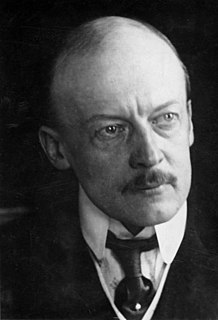
Leopold Anton Johann Sigismund Josef Korsinus Ferdinand Graf Berchtold von und zu Ungarschitz, Frättling und Püllütz was an Austro-Hungarian politician, diplomat and statesman who served as Imperial Foreign Minister at the outbreak of World War I.

Archduke Albrecht Friedrich Rudolf Dominik of Austria, Duke of Teschen, was an Austrian Habsburg general. He was the grandson of Emperor Leopold II and one of the chief military advisors of Emperor Francis Joseph I. As Inspector General for 36 years, he was an old-fashioned bureaucrat who largely controlled the Austro-Hungarian Army and delayed modernization. He was honored with the rank of Field Marshal in the armies of Austria-Hungary (1863) and Germany (1893).

The Austro-Hungarian Army was the ground force of the Austro-Hungarian Dual Monarchy from 1867 to 1918. It was composed of three parts: the joint army, the Imperial Austrian Landwehr, and the Royal Hungarian Honvéd.

The Military Order of Maria Theresa was the highest military honour of the Habsburg Monarchy, Austrian Empire and Austro-Hungarian Empire.
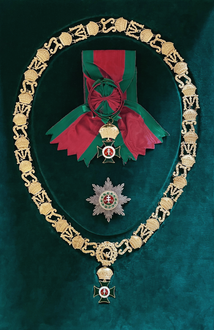
The Order of Saint Stephen was an order of chivalry founded in 1764 by Maria Theresa. In 1938, Miklós Horthy took the rights and activities of Grand Master as Regent of Hungary. The name of the Order changed to the Royal Hungarian Order of Saint Stephen. The Order was terminated at the time of the proclamation of the Second Hungarian Republic in 1946. It was recreated in 2011 as the Hungarian Order of Saint Stephen, and to this day remains the highest order in Hungary.

Generaloberst Arthur Freiherr Arz von Straußenburg was an Austro-Hungarian colonel general and last Chief of the General Staff of the Austro-Hungarian Army. At the outbreak of the First World War, he commanded the 15th Infantry Division. Soon, he was promoted to the head of the 6th Corps and the First Army. He participated on the Gorlice–Tarnów Offensive in 1915 and the countryside of Romania in 1916. In March 1917, he became Chief of the General Staff until his resignation on 3 November 1918.

Franz Emil Lorenz Heeremann Graf von Wimpffen KSMOM was an Austrian General and Admiral who served as Administrative Head of the Austro-Hungarian Navy from 1851 to 1854.

Count Johann (Hans) Nepomuk Wilczek was an Austrian arctic explorer and patron of the arts. He was the main sponsor of the Austro-Hungarian North Pole Expedition in 1872–74.
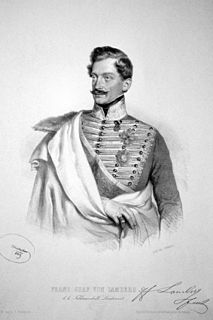
Count Franz Philipp von Lamberg was an Austrian soldier and statesman, who held the military rank of field marshall. He had a short but important role in the Hungarian Revolution of 1848.

Count Stephan Burián von Rajecz, commonly called: "Baron von Burian" or, later, "Count Burian" in English language press reports; (titles from 1900, Freiherr; from 1918, Graf) was an Austro-Hungarian politician, diplomat and statesman of Hungarian origin and served as Imperial Foreign Minister during World War I.

The Austrian Imperial Order of the Iron Crown was one of the highest orders of merit of Austria and Austria-Hungary until 1918.
Lieutenant field marshal, also frequently historically field marshal lieutenant, was a senior army rank in certain European armies of the 17th to 20th centuries. It emerged as the rank of field marshal came to be used for the highest army commander in the 17th century. In German-speaking countries the commander-in-chief usually appointed an "under marshal" or "lieutenant field marshal" to support and represent the field marshal. Amongst his functions as the personal deputy to the field marshal, were the supervision of supply depots and routes, and inspection of the guards.

The Common Army as it was officially designated by the Imperial and Royal Military Administration, was the largest part of the Austro-Hungarian land forces from 1867 to 1914, the other two elements being the Imperial-Royal Landwehr and the Royal Hungarian Landwehr. However, it was simply known as the Army (Heer) by the Emperor and in peacetime laws, and, after 1918, colloquially called the k.u.k. Armee.

The Royal Hungarian Honvéd or Royal Hungarian Landwehr, commonly known as the Honvéd, was one of the four armed forces of Austria-Hungary from 1867 to 1918, along with the Austrian Landwehr, the Common Army and the Imperial and Royal Navy. The word "honvéd" refers to an enlisted private without a rank.
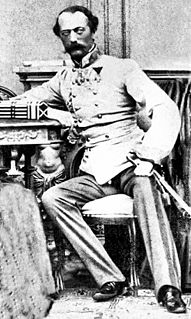
Nikolaus Wilhelm Freiherr Lenk von Wolfsberg was an Austrian officer (Feldzeugmeister), owner of the Corps Artillery Regiment No. 4 and scientist.
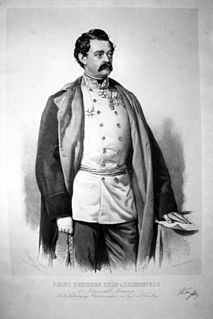
Franz Kuhn von Kuhnenfeld was an Austro-Hungarian military officer who fought against Giuseppe Garibaldi in the wars of Italian independence and served as Imperial and Royal Minister of War from 1868 to 1874. During his term, a unified system of conscription for both Cisleithania and Transleithania was introduced, corporal punishment in military service was abolished, and the Franz-Josephinian Land Survey was initiated. He was a supporter of the Austro-Hungarian polar expedition and an opponent of the Austria-Hungary's 1879 alliance with the German Empire.

Alexander von Koller was an Austro-Hungarian military officer, who achieved the rank of General of the cavalry and served as Imperial and Royal Minister of War from 1874 to 1876.

Ferdinand von Bauer, born Ferdinand Bauer was a general of the Austro-Hungarian Common Army and the Imperial and Royal Minister of War from 1888 until his death in 1893.